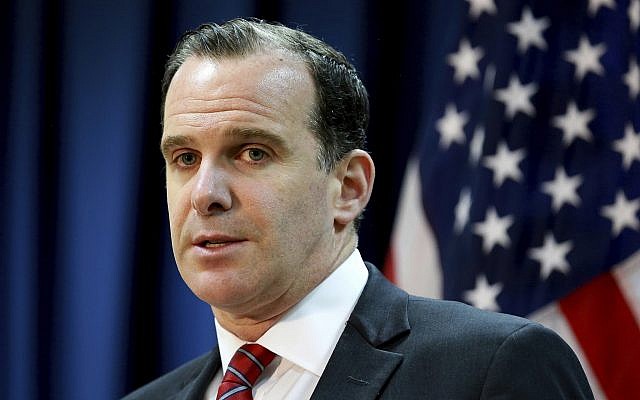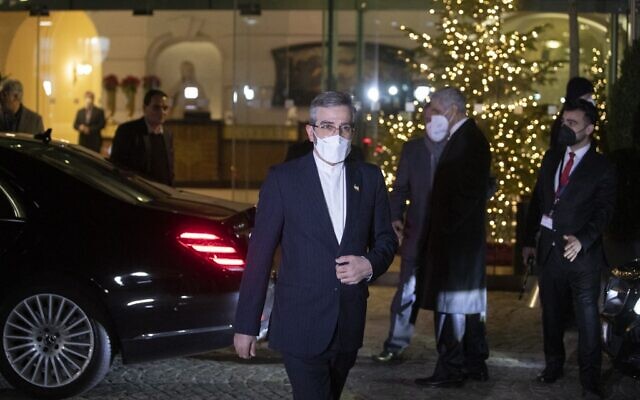“There’s a chance for a deal, and there’s also a pretty good chance there’s not going to be a deal,” he added. “If there’s no deal, we’re very prepared for that scenario.”
Brett McGurk, then-US envoy for the global coalition against Islamic State, at a news conference at the US embassy in Baghdad, Iraq, on June 7, 2017. (Hadi Mizban/AP)
US and Iran ‘in ballpark’ of possible nuclear deal, says White House official
Still, Brett McGurk also cautions that ‘these talks could collapse very soon’; Bennett uses Holocaust commemoration to slam possible deal
By JACOB MAGID27 January 2022, 9:54 pm
An Iranian woman walks past a new mural painted on the walls of the former US embassy in the capital Tehran, on November 2, 2019. (Atta Kenare/AFP)
A senior White House official said Thursday that the United States and Iran are “in the ballpark of a possible [nuclear] deal” in Vienna, while also clarifying that Washington is “very prepared” for the “pretty likely” scenario that there won’t be an agreement.
Iran and world powers are in the midst of an eighth round of negotiations aimed at reviving the tattered 2015 nuclear deal known as the Joint Comprehensive Plan of Action. Former US president Donald Trump withdrew from the deal in 2018, launching a “maximum pressure” sanctions campaign, which Tehran responded to with escalating violations of the multilateral accord.
Trump’s successor, US President Joe Biden, is seeking a joint US-Iran return to compliance with the JCPOA, but has been met by a new, more hardline Iranian president in Ebrahim Raisi, who has demanded the removal of all US sanctions in exchange for the Islamic Republic’s return to the deal.Keep Watching
Asked to comment on the status of negotiations in Vienna during a virtual event hosted by the Carnegie Endowment for International Peace, White House National Security Council coordinator for the Middle East Brett McGurk said, “We’re in the ballpark of a possible deal. But again, I’m not going to put odds on this. There’s [also] a very real chance that these talks could collapse very soon.”
While avoiding taking any sort of definitive stance on where the talks might head, McGurk said they had reached a “culmination point and [that] we’re going to know very soon whether or not it is possible for the Iranians to return to compliance with the nuclear deal on terms that we and the international community can accept.”Get The Times of Israel’s Daily Editionby email and never miss our top stories.
“The prospect of a nuclear-armed Iran is something that would keep anyone up at night, but I can assure you that it’s never going to happen,” McGurk said, adding that a diplomatic path in Vienna is the best way to ensure that.
On Wednesday, the White House said that US National Security Adviser Jake Sullivan told his Israeli counterpart Eyal Hulata that the Biden administration is already “preparing alternative options” to prevent Iran from obtaining a nuclear weapon if Vienna talks fail.
In an effort to defend the Biden administration’s push to return to the JCPOA, McGurk referenced an interview published in Maariv hours earlier in which former IDF chief of staff Gadi Eisenkot called Trump’s withdrawal a “strategic mistake.”
Eisenkot argued that the move, backed by then-prime minister Benjamin Netanyahu, “freed the Iranians from certain shackles [and that] when the Iranians [then] began violating the agreement, they had legitimacy for these violations because of the American withdrawal.”
The Biden administration has been leaning hard on such remarks from current and former Israeli officials as it has doubled down on its blame of the Trump administration for causing the still-unfolding nuclear crisis with Iran.
McGurk was also asked to comment on the recent decision by the US deputy special envoy on Iran to step down from the negotiating team in Vienna along with two others.
Richard Nephew, a longtime State Department official credited with crafting the sanctions that brought Iran to the negotiating table ahead of the 2015 agreement, advocated for a tougher stance against Iran in the Vienna talks than his boss, Rob Malley, and others on the team, the Wall Street Journal reported on Monday. Two other negotiators resigned from the team along with Nephew for the same reasons, according to the paper.
Iran’s chief nuclear negotiator Ali Bagheri Kani leaves the Palais Coburg, venue of the Joint Comprehensive Plan of Action (JCPOA) meeting that aims at reviving the Iran nuclear deal, in Vienna, on December 27, 2021. (Alex Halada/AFP)
McGurk avoided criticizing Nephew, calling him an “incredibly talented teammate” and saying that he had gone on to take a different position at the State Department.
He proceeded to offer implicit criticism of those demanding the US take a maximalist approach in the negotiations. He said the Biden administration could have walked out of negotiations when Iran returned to the negotiation table in December for the first time since Raisi’s election, with completely different demands and ones that reneged on previous agreements reached under his predecessor, Hassan Rouhani.
Instead, the US presented a united front with Russia and China against those proposals, McGurk recalled, saying it led the Iranian rial to collapse.
“The Iranians came back a week later with completely different proposals,” he continued. “That in my view is pretty good diplomacy.”
Separately on Thursday, Prime Minister Naftali Bennett appeared to take a cue from his predecessor, Benjamin Netanyahu, using his International Holocaust Remembrance Day speech to invoke the threat posed by Iran.
“When we hear the Iranian regime’s daily calls to annihilate the State of Israel, as we speak they continue talking about murdering and destroying the State of Israel, the Jewish state, and when we see their rapid progression towards nuclear weapons, indifference is silent acceptance,” Bennett said in a video address to diplomats. “A country who talks about annihilating the Jewish state should not be a legitimate partner for anything.”
“Those who continue to try to attack Jews, to murder Jews, must know the Jew is no longer a punching bag. We swing back and we swing back hard,” he added.
No comments:
Post a Comment